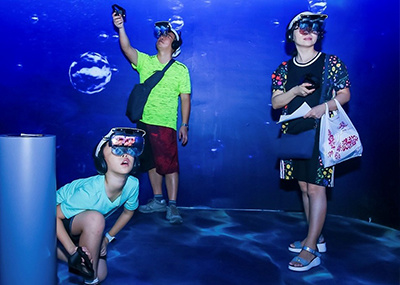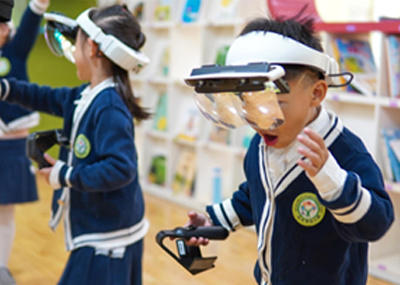How to Design a Hologram 3D Art Museum: Is Mixed Reality the Future of Art Spaces?
- The Rise of Hologram 3D Art Museums: A New Era of Immersive Art
- Designing the Space: Architectural Considerations for a Hologram 3D Art Museum
- Crafting Unique Experiences: Custom 3D Software for Thematic Art Museums
- Overcoming Challenges: What Are the Costs and Considerations?
- The Future of Art: Is Mixed Reality the Ultimate Art Medium?
- What are the benefits of using hologram 3D technology in art museums?
- How much does it cost to build a hologram 3D art museum?
- Can existing museums incorporate hologram 3D technology into their exhibits?
The Rise of Hologram 3D Art Museums: A New Era of Immersive Art
With the constant advancement of technology, traditional art museums are beginning to feel outdated. Enter the hologram 3D art museum—a revolutionary concept that's redefining how we interact with art. But why are these museums gaining popularity so rapidly?
Hologram 3D art museums utilize advanced mixed reality (MR) technology to create immersive environments where art isn't just seen but experienced. These venues incorporate holograms, augmented reality (AR), and even virtual reality (VR) to blend the physical and digital worlds seamlessly. This integration allows visitors to engage with art in unprecedented ways, offering an interactive experience that traditional galleries simply cannot match.
The development of such venues often involves collaboration between technologists, artists, and architects. The goal is to create a space where the digital and physical art forms coexist, elevating the visitor experience. As these museums gain traction, they're not just attracting art lovers but also tech enthusiasts eager to see the latest in mixed reality applications.
So, what technology is at the heart of these futuristic art spaces? The backbone of any hologram 3D art museum is its sophisticated software and hardware system. These venues rely on a mix of high-definition hologram projectors, specialized lighting, and sensors to create life-like images that interact with the physical environment.
Moreover, mixed reality technology is used to overlay digital content onto the real world, blending the boundaries between what's real and what's virtual. This immersive experience is further enhanced by custom 3D software, which allows for the creation of highly detailed and interactive art installations.
For instance, a custom 3D Jurassic-themed children's museum software might be designed to let kids interact with life-sized holographic dinosaurs. The software could include elements like touch-based interaction or even voice-activated responses, making the experience not just visually captivating but also deeply engaging.
Creating such a complex system requires the collaboration of software developers, hologram technology manufacturers, and art curators. It's crucial that the technology is user-friendly, reliable, and capable of delivering high-quality visuals without compromising on performance.
Designing the Space: Architectural Considerations for a Hologram 3D Art Museum
When designing a venue for a hologram 3D art museum, the architecture must be as innovative as the technology it houses. The space should be adaptable, flexible, and capable of supporting a wide range of digital and physical art forms.
One key consideration is the integration of projection systems and sensors into the building's infrastructure. The design must account for the placement of hologram projectors, ensuring they can display images clearly and accurately across various surfaces. Additionally, the lighting system needs to be carefully calibrated to enhance the visibility of holographic images without causing glare or distortion.
Moreover, the layout of the museum should encourage exploration and interaction. Open spaces, curved walls, and minimalistic design elements can help create a seamless flow, allowing visitors to move freely between different installations. The venue should also include dedicated zones for mixed reality experiences, where visitors can don AR or VR headsets and fully immerse themselves in the digital art world.
Lastly, the design must consider the future. As technology evolves, the museum should be easily upgradable, allowing for the integration of new hologram and mixed reality systems without requiring extensive renovations.

Crafting Unique Experiences: Custom 3D Software for Thematic Art Museums
To truly stand out, a hologram 3D art museum must offer unique experiences that can't be found elsewhere. This is where custom 3D software comes into play. By developing software tailored to specific themes or exhibits, museums can create highly specialized and immersive environments.
Take, for example, a custom 3D Jurassic-themed children's museum. The software might include interactive displays where kids can "dig" for fossils using holographic tools or walk alongside holographic dinosaurs in a recreated prehistoric landscape. The software could also feature educational games, making learning fun and engaging.
Creating such specialized software requires close collaboration between the museum's curators, educators, and software developers. The goal is to create a cohesive experience that not only entertains but also educates and inspires. By leveraging the latest software development tools and techniques, museums can craft experiences that leave a lasting impression on visitors of all ages.
Overcoming Challenges: What Are the Costs and Considerations?
While the idea of a hologram 3D art museum is undoubtedly exciting, it's essential to consider the practical challenges involved in bringing such a project to life. One of the most significant factors is the cost.
Building a hologram 3D art museum is not cheap. The price of high-quality hologram projectors, mixed reality systems, and custom 3D software can be substantial. Additionally, the cost of integrating these technologies into the building's design and ensuring they function seamlessly can add up quickly.
Furthermore, ongoing maintenance and upgrades are necessary to keep the museum's technology up-to-date and functioning smoothly. This includes software updates, hardware replacements, and system recalibrations.
However, despite these challenges, the potential return on investment (ROI) can be significant. A well-designed hologram 3D art museum can attract a diverse audience, from art lovers to tech enthusiasts, generating significant revenue through ticket sales, merchandise, and special events. Moreover, the museum can become a cultural landmark, boosting tourism and local business.

The Future of Art: Is Mixed Reality the Ultimate Art Medium?
As we look to the future, it's clear that mixed reality is poised to become a dominant force in the art world. But is it the ultimate art medium? While traditional art forms like painting and sculpture will always have their place, mixed reality offers something entirely new—an art form that transcends the physical limitations of the real world.
Mixed reality allows artists to create works that are not bound by the constraints of canvas or stone. Instead, they can craft immersive environments where viewers can step inside the art, interact with it, and even alter it. This level of interactivity is something that traditional art forms simply can't offer.
Moreover, mixed reality art can be more inclusive and accessible. For example, digital replicas of famous works can be shared online, allowing people around the world to experience them without having to travel. This democratization of art could lead to a more diverse and engaged global audience.
However, like any new medium, mixed reality art also faces challenges. These include technical limitations, high costs, and the need for specialized skills. But as technology continues to evolve, these challenges are likely to diminish, paving the way for mixed reality to become an integral part of the art world.
FAQs
What are the benefits of using hologram 3D technology in art museums?
Hologram 3D technology enhances the visitor experience by offering immersive and interactive art displays. It allows museums to showcase art in new and innovative ways, making exhibitions more engaging and memorable.
How much does it cost to build a hologram 3D art museum?
The cost varies widely depending on the size of the museum, the complexity of the technology, and the level of customization required. On average, it can range from several million to tens of millions of dollars.
Can existing museums incorporate hologram 3D technology into their exhibits?
Yes, existing museums can integrate hologram 3D technology into their exhibits. However, this may require significant modifications to the venue's infrastructure and careful planning to ensure the technology enhances rather than detracts from the overall experience.

How Can Simulator Design Solutions Transform Sports & Fitness Game Zones?

What Is the Configuration, Structure, and Working Principle of VR Dynamic 7D Cinema?

VR Arcade Equipment Buying Guide: 5 Costly Mistakes Every New Owner Makes (2026 Edition)

Projector Configuration Requirements for Parent-Child Interactive Play Areas: What Do You Really Need to Get It Right?

How Do Indoor Football Simulators Enable Real Interaction Through Sensors?
Standard and other
Are you an amusement park equipment manufacturer?
Yes. We have our own production factory, which is located in Guangzhou, China, covering an area of over 2,000 square meters. With our professional production team, we are able to ensure high quality and on-time delivery of our products. All products have undergone rigorous testing and quality inspection. You are welcome to visit our factory.
Do you offer a customized service?
We can provide logo customization service for all of our products. For certain products, we can also support customization of sizes and game content. If you have any product customization requirements, please contact us and we will confirm the details with you.
How will it be transported?
For large items, we usually use sea freight, while for small items, we use air freight or services like DHL, FedEx, or UPS. We can also accommodate specific shipping methods based on your requirements.
Product details
What are the special effects in a 5D cinema?
JAMMA 5D cinema has special effects such as water spray, smoke, bubbles, snow, lightning and so on, which allows it to provide a realistic and immersive experience.
Can I customize the number of seats of 5D cinema?
Yes, we generally have options for six, nine, eighteen, twenty-four, and thirty-six seats, and the quantity of seats also can be customized.

Hottest activated LED dance grid tiles floor touch games
Super Grid is an immersive sports game that combines sports and technology. It integrates interactive LED lights and sensors through innovative software design, creating a fun gaming experience.

Top Indoor Tennis Racketball Training Simulator Dual Player Games
Interactive somatosensory fitness game
Combine traditional tennis sports with advanced 3D digital technology to bring customers an immersive tennis training experience
COMBINE TRADITIONAL TENNIS SPORTS WITH ADVANCED 3D DIGITAL TECHNOLOGY TO BRING CUSTOMERS AN IMMERSIVE TENNIS TRAINING EXPERIENCE INDOOR AND TENNIS EXPERIENCE HALL

Super Grid Interactive LED Floor Activate Game Team Play
Super Grid is an immersive sports game that combines sports and technology. It integrates interactive LED lights and sensors through innovative software design, creating a fun gaming experience.

Immersive 5D/7D/9D cinema dynamic visual experience room
Compared with other types of theaters, 5D/7D/9D cinema have high technical content, prominent themes, and have a strong impact on the characteristics of the picture. With the increasing demand in the entertainment market and the continuous development of video entertainment technology, in the past, audiences would experience vibration, drop, rain, scratches and other effects in some 4D theaters, but now with 5D theaters, audiences can experience new Unique features, touch and feel effects such asreal smoke, water, snow, bubbles, smell, lightning, leg touch,camera system and more. When the audience is watching amovie, the seats and environmental effects will change into corresponding actions according to the development of the movie,allowing the audience to experience an immersive viewing experience.
Get in Touch With JAMMA
Would you like to learn more about indoor & outdoor playground equipment?
We would be happy to help you and find the best solution for your needs.

